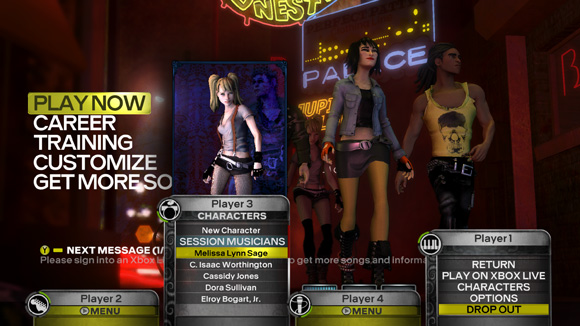

Harmonix has long set atop the music game pecking order, and Rock Band 3 is another very strong effort. The traditional music gameplay we've enjoyed for years is as good as ever, and arguably the best it has ever been. But the inclusion of an entirely new instrument and the well-marketed Pro mode additions are Rock Band 3's true focus.
There is much to talk about in regards to what's new on the Rock Band 3 disc alone, from the refinements to the user interface to the new track list and the revised progression system. A new overlay is the biggest change to the UI. It allows each player to adjust settings, difficulty, or drop in and out with ease. One of the more tedious tasks in previous Rock Band games was moving a gamertag from one instrument to another. This chore is much easier in Rock Band 3; if I’m logged in on guitar and want to swap to drums, I just plug in the drums, push start, select “swap to DjinniMan” on the overlay, and I’m ready to do my Animal impression. While this is a great addition, swapping multiple gamertags isn’t nearly as smooth, and requires one player to sign out before the swap will work. This still interrupts the flow of the experience, but not nearly as much as before.
Rock Band 3’s track list is quite impressive, with eighty-three songs on disc. Each song is unlocked from the beginning, so there’s no need to play through a career in order to find your favorite. The list is quite eclectic, and very different from other Rock Band games. There is a definite pop rock feel to the list, probably because of the inclusion of keyboard tunes. You’ve got the Beach Boys and Huey Lewis on one end, but there’s still bands like Slipknot and Anthrax on the other. I found the setlist very, very strong, but I must confess I am a big fan of 80s music. Your own opinion may vary. Of course, all your previously downloaded songs are available, and exports from any non-Beatles Rock Band disc work just fine too.

World Tour mode has been removed from Rock Band 3, though you can still create your own band and customize it to your liking. The main progression through the game is measured by Career Goals, which function very much like achievements or trophies. Fans are earned by meeting these goals, which include tasks like getting a long note streak, or playing an instrument for the first time. While there are special set lists available to help you meet each of these goals, you can still get the classic road tour feel by taking on Road Challenges. These short tours take the band through a handful of cities, playing at one venue in each location. At each venue, you can choose a preset list of songs, or from two alternatives. These alternatives are typically either random songs from a particular genre or decade, though sometimes you can choose a custom list instead. I found this to be a very nice alternative to the lack of choices offered in Guitar Hero Warriors of Rock.
During Road Challenges, you have more to worry about than merely earning stars. Spades are a new currency in this mode. Each star is worth a spade, and the band can earn up to five more per song. Each set list has a different requirement for earning these additional spades; some ask for all players to nail as many sections as possible together. Others require you to maintain Overdrive as long as possible, or even go as long as possible without missing a note when you are in the spade spotlight. While these are nice additions to the formula, they don’t really change the way you play. For the most part, you earn spades the same way as you do stars: hitting the notes accurately. You are awarded gold, silver, or bronze ratings for each Road Challenge by meeting spade thresholds; these ratings are tied into Career Goals.
One change that I am not particularly fond of is the fact that each player creates his or her own band. During play, each separate band earns fans, unlocks vehicles like the van or the airplane, etc. I suppose this was implemented to appease groups who don’t always play together, but I think it detracts somewhat from the cooperative feel. When everyone is in the same band, reaching goals together means a whole lot more than unlocking the van for the third time, for instance. Also, why doesn’t the crowd sing along with the band in Rock Band 3 songs? That was a favorite feature of mine and I am sure for others as well. These are minor quibbles, perhaps, but still irksome.
If Rock Band 3 were a disc only release, for standard drums, guitars, and vocals, it would still be a fine music game. The refinements to the interface work nicely, though there is still room for improvement in managing gamertags. The songs included are a great mix, and sorting through them has never been easier. The setlist and other improvements are easily worth the cost of the disc alone. However, the addition of keyboards and Pro Mode take Rock Band 3 to the next level of innovation in the music game genre.
The Rock Band 3 keyboard is wireless, and covers two octaves, with full-sized keys. It is shaped like a keytar, and comes with a strap to be used as such, but it works fine on a tabletop or even on your lap. The neck area has a touch sensitive strip that can be used for pitch bending effects, plus the overdrive button. The keyboard is divided into colored areas corresponding to the buttons on the guitar controller, from red to orange. Navigation buttons are above the keys, and there is a MIDI port available to connect the keyboard to a computer. The wireless unit feels sturdy and well-made.
The keyboard is another part to add to your Rock Band, allowing a fourth player before you add in vocals. There are two tiers of difficulty for keyboard, Pro and standard. Standard keys is very simple for music game veterans, only using five keys, each in a row. I was able to play standard keys on Expert after only two or three songs. Pro keys was quite a bit more difficult. The Pro note track is ten white notes wide, and is color coded to indicate which keys to use. White and black keys fall down the note track in a manner that is instantly familiar to Rock Band fans. On Easy and Medium Pro, the tracks don’t shift from one colored section to another, but on harder levels they do.
Easy Pro Keys was quite a step up in difficulty from standard Expert. Thankfully, there is an extensive tutorial, which is in depth and yet still accessible. It’s light on actual music theory, but in most other respects its a great way to develop keyboarding skills. You won’t be able to read standard piano music, but you will know hand placement and many other “nuts and bolts” keyboard skills. I wish I’d had Rock Band 3 when I was attempting to learn piano in college, that’s for sure.
Pro Mode isn’t just available for keyboard, though: guitar, bass, and drums get the additional tier of difficulty, as well as the trainers. Pro Drums requires a cymbal kit, and adds circles to the standard notes in the track to denote them. Pro Guitar and Bass require a special controller. One model, available now, is $150 and functions only as a Rock Band instrument. Next March, a “real guitar” with special sensors will be released, which can be used as a controller or plugged into a real amp, for $280. I have not had the chance to test either Pro Drums, Guitar, or Bass, but if Pro Keys is any indication, it will be a long-term challenge to master Pro Expert on any instrument. Pro modes are selectable when playing in a full band, just like the standard difficulty levels.
As with most music games, Rock Band 3 is an excellent cooperative experience. Teaming up with a group of friends is as fun now as it ever was. Vocal harmonies, like those of The Beatles Rock Band, return, and with the added keyboard, you can play co-op with a band of seven members. This is the best in the genre, by far, and Harmonix should be lauded for pushing the limits of what can and can’t be done in a music game.
However, the total experience isn’t quite as good for a large group due to some limitations that I can only assume are due to hardware issues. Anytime all four instruments are used, the game prompts you to enable “All Instruments Mode”. In this mode, the vocals no longer get a controller, and are presented karaoke style, with no scoring, overdrive, or even difficulty selection available. Additionally, all venues shift to a music video style background, which can be repetitive and distracting. This may not seem like a big deal on the surface; after all, who has seven players around except for a big party where you don’t really care about scoring anyway?
But there’s more to it than that. All Instruments Mode is required anytime you want to have keyboards, guitar, and bass, even if those are the only three parts signed on. This limitation is a bit puzzling, and frustrating. Another issue is that you can’t go online in All Instruments Mode, so if you join a band online with guitar and bass in it already, you cannot play keyboards at all. You can do so if there is only one guitar or one bass, but it’s a bummer nonetheless.
And then there’s the issue of keyboard parts. Keys tends to be very dry, with long empty sections in many songs. Most songs on disc in Rock Band 3 have a keyboard part, but not all of them do, and when you add in your exports and DLC from previous games, none of which have keys parts, a keyboard player will often find themselves with nothing to play. You can pick the bass or guitar parts on the keyboard, but only if that part isn’t already being covered. Guitar Hero 5, released over a year ago, allowed doubling up of instruments. If this was implemented in Rock Band 3, the lack of keyboard parts would be solved. I can think of no other area in which Harmonix trails Activision in music game innovations, but “mix and match” gameplay like that of recent Guitar Hero titles would solve many of the co-op problems in Rock Band 3.
Even with these problems, Rock Band 3 is still a top-tier title. The core Rock Band experience has been tweaked and adjusted to a high level that is very close to perfection. Teaming up with friends to rock the house is still awesome. But All Instrument Mode’s shortcomings and the lack of mixing and matching instruments are perplexing. It’s clear that the major focus of the game is on the new keyboard instrument and the various Pro Modes, almost to the detriment of the cooperative elements. In the end, Rock Band 3 is a major revolution to the music game genre, and possibly the best music game yet, but there’s still some room for improvement as far as co-op is concerned.